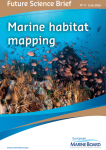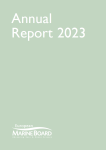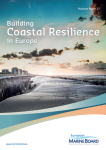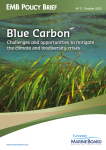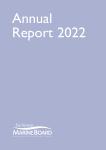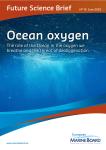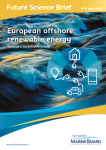Homepage publication
Throughout 2023, EMB organised a range of impactful initiatives, such as the EurOCEAN 2023 conference, the first EMB ECOP Network Forum, a Brown Bag Lunch, and the launch of four new foresight publications. EMB also continued its EMBracing the Ocean artist-in-residence and EMB Ambassador programmes. To learn more about EMB’s activities and achievements, dive into the EMB's 2023 Annual Report.
In 2022, the EMB Secretariat moved to the brand-new InnovOcean campus in Ostend (Belgium), where many valuable interactions and discussions have already taken place. Throughout the year, EMB organised a range of impactful initiatives, such as the CommOCEAN conference, a Brown Bag Lunch, and the launch of three new foresight publications. EMB also took a new turn by launching 'EMBracing the Ocean', an artist-in-residence programme which stimulated collaboration between Ocean scientists and artists, leading to remarkable artworks that reflect the deep connection between art and ocean sciences. To learn more about EMB’s activities and achievements, dive into the EMB's 2022 Annual Report.
EMB Future Science Brief No. 10 highlights the most recent science on Ocean oxygen, including causes, impacts and mitigation strategies of Ocean oxygen loss, and whether “every second breath we take comes from the Ocean”. It closes with key policy, management and research recommendations to address Ocean deoxygenation and communicate more accurately about the role of the Ocean in Earth’s oxygen.
EMB Future Science Brief No. 9 provides an overview of the technology and European deployment status in the offshore renewable energy sector. It discusses the environmental and socioeconomic considerations, and presents the key knowledge, research, and capacity gaps that must be addressed to ensure sustainable delivery of the EU Green Deal. It closes with key policy, research, capacity, and data recommendations to take the sector forward.
Today, EMB launches its Future Science Brief N°8 ‘Marine Science Communication in Europe: a way forward’ in a dedicated webinar. Over the coming decade, marine science communication will become even more critical to achieving a more Ocean literate and sustainable society. Increased scientific dissemination and specialized communication will be required to support this increase in Ocean awareness. This document has been developed by the European Marine Board Communications Panel (EMBCP) and is underpinned by surveys among 80 European experts, 1861 students and 23 EMB Member organizations.
New Ocean challenges and opportunities fuel the need for enhanced marine and solution-oriented science communication. This Future Science Brief highlights the critical need to strengthen the marine science communication capacity in Europe, as well as develop dedicated training programs, engage in deeper and wider collaboration with stakeholders, and ensure close interaction with the UN Decade of Ocean Science for Sustainable Development (2021-2030) and the EU Mission: Restore our Ocean and Waters by 2030.
